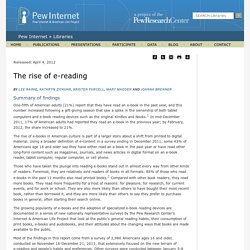

E-Books Could Be The Future Of Social Media ⚙ Co. “I’ll give up my printed books when you pry the last one from my cold, dead hands.” 3Reactions That’s what I tell people when they ask me what kind of e-reader I have.
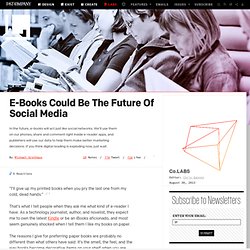
As a technology journalist, author, and novelist, they expect me to own the latest Kindle or be an iBooks aficionado, and most seem genuinely shocked when I tell them I like my books on paper. The reasons I give for preferring paper books are probably no different than what others have said: It’s the smell, the feel, and the way books become decorative items on your shelf when you are done absorbing all the wonderful words they contain. But as a technology journalist, I also know that one day I will be dragged into the digital book future whether I like it or not--or be left behind with no new stories to read. Research Shows Students Perform Well Regardless of Reading Print or Digital Books. Newswise — Research by an Indiana State University doctoral student found that students did equally well on a test whether reading from a digital book or a printed one.
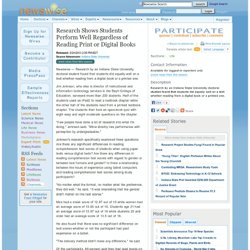
Jim Johnson, who also is director of instructional and information technology services in the Bayh College of Education, surveyed more than 200 students. Half of the students used an iPad2 to read a textbook chapter while the other half of the students read from a printed textbook chapter. The students then took an open-book quiz with eight easy and eight moderate questions on the chapter. "Few people have done a lot of research into what I'm doing," Johnson said. "Mine directly ties performance with perception by undergraduates. " Johnson's research specifically examined three questions: Are there any significant differences in reading comprehension test scores of students when using paper texts versus digital texts?
Get_file. About. No Shelf Required® is a blog about eBooks, loosely defined to discuss eBooks, audio books, and other digital content found in libraries as well as the technology needed to read and listen to this digital content.
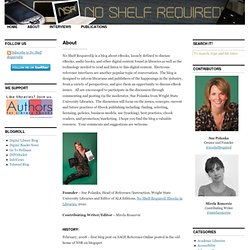
Electronic reference interfaces are another popular topic of conversation. Feighan.pdf (application/pdf Object) A Guide to Publishers in the Library Ebook Market. Last updated July 6 The ebook library lending policies of the Big Six publishers garner most of the attention, because public libraries regard access to best-selling titles as a critical service.
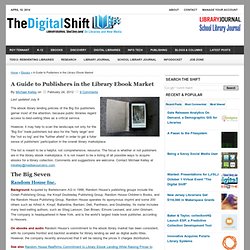
However, it may help to scan the landscape not only for the “Big Six” trade publishers but also for the “fairly large” and the “not so big” and the “further afield” in order to get a fuller sense of publishers’ participation in the overall library marketplace. The list is meant to be a helpful, not comprehensive, resource. The focus is whether or not publishers are in the library ebook marketplace. It is not meant to be a listing of all possible ways to acquire ebooks for a library collection. The Big Seven Random House Inc. Background Acquired by Bertelsmann AG in 1998, Random House’s publishing groups include the Crown Publishing Group, the Knopf Doubleday Publishing Group, Random House Children’s Books, and the Random House Publishing Group.
HarperCollins Publishers Macmillan Penguin Group USA. Everything you wanted to know about ebooks in Australia. E-Books: How Should Schools Embrace the New Technology? By Jason Bedell, on December 13th, 2010 I just finished reading my first full-length e-book last night.
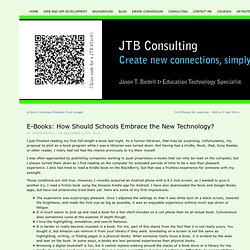
The Reading Brain in the Digital Age: The Science of Paper versus Screens. In a viral YouTube video from October 2011 a one-year-old girl sweeps her fingers across an iPad's touchscreen, shuffling groups of icons.
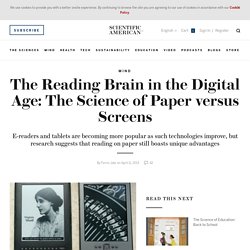
In the following scenes she appears to pinch, swipe and prod the pages of paper magazines as though they too were screens. When nothing happens, she pushes against her leg, confirming that her finger works just fine—or so a title card would have us believe. Travis’s Excellent (Ereader) Adventure. Illustration by Travis Jonker; Photography by Craig van der Lende.
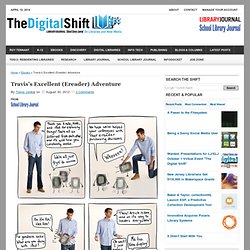
Last year, we rolled out an ereader lending program in my fifth and sixth grade school library, and I plan to share here the ups, downs, and what-to-look-out-fors we encountered along the way. We’ll talk planning and implementation of the program—but first, a bit of background. Let’s hop into the librarian time machine (fashioned from an old card catalog I found on Etsy) and go back to August 2011…. Background Each year, my school district offers an Innovation Grant to employees.
It would allow all students access to this fast-growing form of technology, especially those who would not otherwise have access due to socioeconomic status.It would generate excitement for reading. We outlined these benefits in our program goals, put together a time line for reaching them, and sent the whole thing to the powers that be. Planning. Launching an Ereader program in a school library « Mindy Hardwick's Blog.
By mindyhardwick on September 3, 2012.
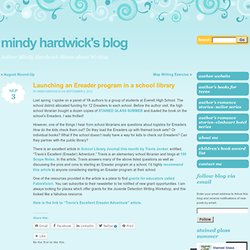
The rise of e-reading. Released: April 4, 2012 By Lee Rainie, Kathryn Zickuhr, Kristen Purcell, Mary Madden and Joanna Brenner.
